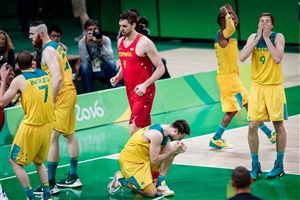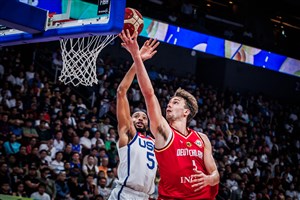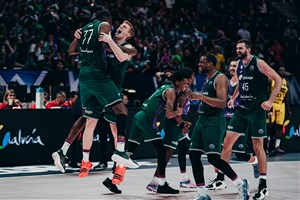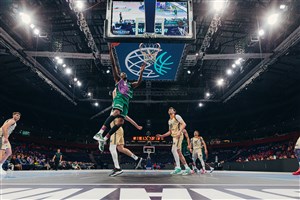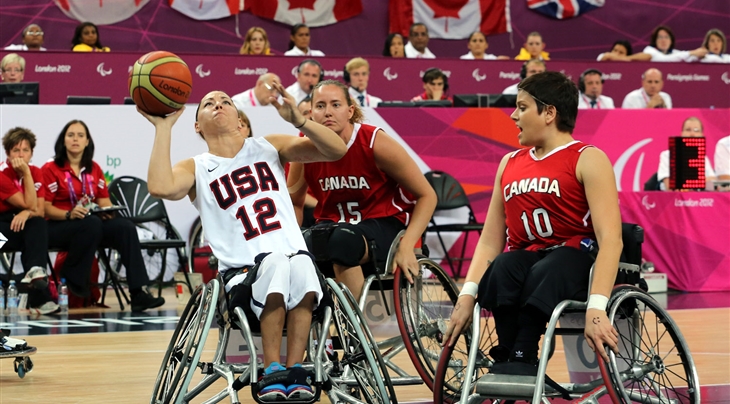
Retrospect is a wonderful thing - Paralympic refs get some help
CHARLOTTE (Steve Goldberg's Wheel World) - Following the lead of FIBA and the Olympic Basketball Tournaments for Men and Women, the IWBF has approved the use of video review for the Rio. And that's a good thing as it might have made a difference in the podium in London four years ago.
Let me paint the picture.
September 6, 2012. Tied at the half, the USA women's wheelchair basketball team had just suffered an anemic third quarter, scoring only 4 points to trail Australia by 10 with a spot in the London 2012 gold medal game on the line.
As his team huddled before the final quarter, Gliders coach John Triscari advised his team, "They will come back! We have to stop them!"
His warning rang true. The defending Paralympic champions from Athens and Beijing would turn it around, holding the Gliders to just 2 points in the fourth while scoring 11.
It should have been 13.
This is the entire AUS-USA game broadcast. For the last decisive moments, forward to 1:40:00 in the video.
Trailing 40-37, USA forward Desi Miller scored from top of the key to close within 1 point with 27.9 left in regulation. After an Aussie timeout, two quick fouls by Miller on Aussie restarts put her out of the game, something coach David Kiley did not want but understood - "I didn’t want her out but it was the right thing." - as Miller sacrificed herself to save seconds for her team.
The last foul also put Amber Merritt on the line with 26.7 to play. The risk reaped reward as Merritt's first shot was long, bouncing off the plate behind the rim. The second free throw hit the back right of the rim and was rebounded by the USA's Becca Murray.
The Americans quickly moved the ball up the court ending up in the hands of forward Natalie Schneider who was stymied by the Gliders swarming defense outside the 3-point line.
That was until she found Rose Hollermann rolling off a pick. Hollermann may be a mainstay of the American team heading to Rio but in London four years ago, she was the youngest in the tournament, a player being groomed for the next games.
"The cost of (Miller) fouling out was having to go to a 16-year-old. It was a big deal." - Kiley
It almost was. Shaking free of Merritt and breaking down the middle, Hollermann took the pass from Schneider and pushed towards the basket.
"She got fouled," says Kiley. "The contact knocked her up on two wheels."
But it didn't knock her off track and her shot from a few feet out, right of center with 3.3 seconds on the clock was as good a look as you could hope for. And all coaches and players at this level know that it would take more than that at this point in a game to get a call on either end of the court.
It was a good look and a good shot under the circumstance but the physics of wheelchair basketball that have to combine the direction, motion and velocity of the chair with the instant muscular calculations of push, release and trajectory of the ball, not to mention computing for the variances created by a bump or two from a defender in the middle of all that are a wondrous and fickle thing.
As the ball rolled off the rim to the left, Kiley's head dropped so he didn't see that Alana Nichols had instinctively rolled off the pick that she too had been trying to set for Schneider and was under the basket waiting.
As Hollermann's shot hits the rim, the shot clock shows 1 second left. Photo capture from IPC video via YouTube
He didn't see that Nichols training put her in the exact place she needed to be and that she would be the hero of the moment. She rebounds and throws it back up in one motion, the ball dropping through the net with 1.9 seconds showing on the clock.
"We were frantically picking for Natalie," says Nichols. "That's why I was so wide open."
In the moment, the shot clock, which read 1 second, was not reset as the ball hit the rim and the buzzer went off as Nichols' shot was going back up and in.
“My attention to that came when the crowd in front of me erupted like something great had just happened," he tells me. "They saw the ball go in. My head had dropped.”
Nichols knew it was good. "As I looked back at my team and the refs and the coaches, I obviously thought, 'Wow, what an incredible position to be put in, to be the hero of the semifinal game. The second that I felt that, I looked over at the ref who called a shot clock violation. I was utterly and completely confused by that.

The ball drops through the net on what should have been Alana Nichol's potentially game-winning putback against Australia with 1.9 seconds left in a London 2012 semifinal. Photo capture from IPC video via YouTube.
But it was waived off as the officials looked at each other before one indicated, touching his shoulder, that the shot would not count. In all fairness, it was a frantic moment for all on the court as well as those of us off it, and the buzzer came a split second after Rose's shot rolled off the rim.
Retrospect is easy now. I was there but the detail of my description comes from watching the play over and over again to ensure that every detail I tell you is correct.
Any official review of the play then would have shown that the shot by Rose hit the rim before the shot clock buzzer sounded and therefore Nichols putback should have been scored. But video replay review wasn't on the books for the Olympic or Paralympic tournaments in London.
So the Americans who had fought back so hard were denied a go-ahead basket. Granted, Australia may have scored in the remaining 1.9 seconds but that doesn't matter now.
What does is that a similar situation at the games in Rio may be fairly adjudicated as new rules are in place according to IWBF article 46.12 under Referee: Duties and powers, which reads identical to the FIBA text.
Nichols will be in Rio, not on the court but on the water churning for a medal in a kayak. Would another medal have kept her playing hoops? She doesn't believe so.
"I had a great run with the team," she told me last week, including a gold medal from Beijing, but felt it was time to move on to another challenge.
She was happy to hear that an instant replay system will be used in Rio but adds, "it is a hard pill to swallow that it was not (used) in 2012," when the technology did exist.
Kiley will be watching from his home in North Carolina, still chafed by the moment in London that kept his team out of the final and possibly cost him a chance to lead them through this cycle as well.
Mistakes can have consequences far beyond what most eyes can see. Hopefully, the chance for instant video retrospect now can change that for the better.
Steve Goldberg
FIBA
FIBA's columnists write on a wide range of topics relating to basketball that are of interest to them. The opinions they express are their own and in no way reflect those of FIBA.
FIBA takes no responsibility and gives no guarantees, warranties or representations, implied or otherwise, for the content or accuracy of the content and opinion expressed in the above article.
To help make this column as inclusive as possible, please send any national or international event information, story suggestions, or comments to wheelworldmail@gmail.com.


